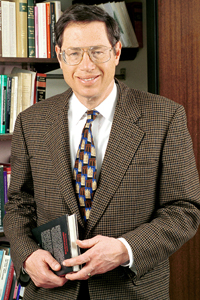Chicago In the News
The Chronicle’s biweekly column Chicago In the News offers a digest of commentary and quotations by a few of the University faculty members, students and alumni who have been headlining the news in recent weeks. Chicago faculty members are some of the most frequently quoted experts, so space allows publishing references to only selected examples. To read many of the full newspaper articles mentioned in this column, visit the University News Office Web site: http://news.uchicago.edu.
 Photo by Lloyd DeGrane Richard Epstein |
|
Governor going ‘off the rails’
Richard Epstein, the James Parker Hall Distinguished Service Professor in the Law School, weighed in on the controversy surrounding Illinois Gov. Rod Blagojevich’s appointment of a new United States senator in a Thursday, Jan. 1 article on the Reuters news wires. Blagojevich, arrested in early December, ignored warnings from members of his political party by appointing Roland Burris to the post on Tuesday, Dec. 29. “It’s off the rails. What else could be crazier?” said Epstein. This week, the secretary of the Senate blocked Blagojevich’s choice and refused to seat Burris. Epstein said the U.S. Constitution allows senators to block a nominee based on credentials, but “it’s not at all clear that they can force their way into this situation.”
Co-op bookstore’s main character
Jack Cella, the longtime general manger of the University’s Seminary Co-op Bookstore, was the focus of a piece that appeared in the Chicago Tribune and Los Angeles Times. Cella, 62, has run the store since 1968 and has seen it grow from more than a dozen members to 53,000, including President-elect Barack Obama (who joined in 1986). “Jack is the soul of the bookstore,” said Katy O’Brien-Weintraub, Senior Lecturer in the Social Sciences Collegiate Division. “Many others have contributed to the growth and success of the store, but Jack has made it what it is.” The article referred to the Co-op as “a theme park for the mind” and “a paradise of print.” Cella said the store’s wide-ranging selection: “If you’re in a decent bookstore, you can look at any shelf and realize how little you know. I can’t imagine life without reading.”
Gathering cash instead of dust
A Sunday, Dec 28 article in the Chicago Tribune identified a growing number of collectors who are selling their prized possessions for quick money. Allen Sanderson, Senior Lecturer in Economics and the College, said consumers are dealing with the current financial recession by creating their own liquidity. The article states that from timepieces to guitars to comic books to art, the collectible market is being flooded. Sanderson said that people usually have five or six times as much in assets than income, and selling collectibles is a short-term option for converting items into cash. “Most people are not getting raises,” Sanderson said. “How do I pay for the kids’ college or the vacation in St. John? I convert assets into something I can spend this year.”
Body, soul link highlighted
USA Today named a University expedition team’s discovery of an eighth-century B.C. stele, which shows ancient Egyptians believed in a separate body and soul, one of its top science stories of 2008. In a Monday, Dec. 29 article, the newspaper featured advancements, including stem cells and DNA, atom smashers, ancient Incan pigments and astronomy. Yet the Neubauer Expedition’s discovery in Turkey of the 800-pound, 3-foot-tall inscribed basalt stone—a cremation inscription for an Assyrian city official—merited recognition. “It’s the first inscription to make really clear what these people understood about the afterlife in terms of the soul,” wrote David Schloen, Associate Professor in the Oriental Institute and Director of the Neubauer Expedition, in Archaeology, which named 2008’s top discoveries.
New technology, ancient patient
The Medical Center’s new 25-slice CT scanner recently welcomed its first patient—Mersamun, a 3,000-year-old mummy from the Oriental Institute. The cutting-edge machine is the first of its kind in Illinois and promises to deliver faster, more accurate images. The new device completed a full-body scan in 10 seconds; it took a 16-slice machine eight hours to scan Mersamun in 1992. The new scanner will benefit today’s patients by allowing doctors to quickly diagnose heart problems and identify tumors, and it may replace surgical angiograms in the future. “The chances in the long term of angiography remaining the way it’s done today … if people think that, I guess they’re driving around in stagecoaches and using telegraphs,” said Michael Vannier, Vice Chair for Clinic Research Radiology and Professor in Radiology. The article appeared in the Thursday, Dec. 25 Chicago Tribune.
No Jurassic Park just yet
Jerry Coyne, Professor in Ecology & Evolution and the College, cast doubt on recent hopes that scientists may one day resurrect a woolly mammoth. According to a Sunday, Jan. 4 Chicago Tribune article, scientists hope advances in genetic engineering could allow recreating animals from shares of DNA from hair, hooves or fur, including those of the mammoth—a long-extinct relative of elephants. But for that to happen, said Coyne, DNA has to be organized into chromosomes, and technology is lagging in that regard. He said that 99 percent of all species once on Earth went extinct without leaving descendants. People like to think “a species that goes extinct will someday be resurrected, but extinction if forever,” Coyne said. “The rest is frivolity.”
Grandparents gain from child care
Linda Waite, the Lucy Flower Professor in Sociology and the College, examined the health benefits and concerns of child-caring grandparents in a Sunday, Jan. 4 article in USA Today. Waite was the co-author of a 2007 study following 12,872 grandparents, ages 50 to 80, which was published in the Journal of Gerontology. It found that grandmothers who babysit 300 to 500 hours a year exercise more and get depressed less, while those who became “substitute parents” saw an increase in depression and obesity. While some grandparents need more support, Waite said child care is beneficial overall because “it gets people up and moving.”
![[Chronicle]](/images/sidebar_header_oct06.gif)